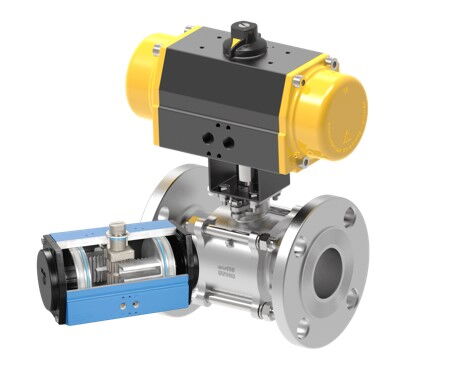Pneumatic Ball Valves: From Normally Open to Normally Closed
On this page
Single-acting pneumatic ball valves play a crucial role in modern industrial control systems, particularly in the fields of automation and process control. Their working principle relies on a pneumatic actuator that uses air source pressure to regulate the opening and closing of the pneumatic ball valve. In certain application scenarios, it may be necessary to change its operating mode from normally open to normally closed to enhance system safety, energy efficiency, and operational flexibility.
Achieving a normally closed state for single-acting pneumatic ball valves requires corresponding adjustments to the pneumatic actuator. Here are several main modification methods.
Springs play a vital role in single-acting pneumatic ball valves. Typically, the valve opens under air source pressure, and the spring is responsible for closing it when the air source pressure is lost. By increasing the spring force, it can be ensured that the valve remains closed in the absence of air source pressure. This design can protect the safety of downstream equipment and processes by ensuring rapid valve closure in the event of air source failure or unexpected situations.
Replacing the spring with one of different elasticity is also a direct and effective modification method. Springs of different elasticities affect the force required to close the valve. By selecting the appropriate spring, the opening and closing behavior of the valve can be precisely controlled, ensuring its reliability and stability under various conditions.
In addition to internal adjustments, adding external devices is also an effective means of changing the valve state. For example, solenoid valves can be activated under specific conditions to generate sufficient force to push the ball valve open. This method not only provides greater operational flexibility but also enables remote control, meeting the needs of modern intelligent control systems.
By adjusting the air source pressure, the normally closed state of the valve can be influenced. Increasing the air source pressure allows the valve to open smoothly, while reducing it keeps the valve closed. This method ensures the stability and efficiency of system operation in special applications where fluid flow rate control is required.
Converting single-acting pneumatic ball valves to a normally closed state brings several significant advantages.
In many industrial environments, the normally closed state effectively prevents fluid leakage, especially in the event of unexpected interruption of air source pressure. The valve can close rapidly, reducing safety hazards. This feature is particularly important in applications involving hazardous fluids, such as chemical processing and oil transportation.
In the normally closed state, the valve only consumes air source pressure when opening, thereby significantly reducing energy consumption. In the normally open state, continuous air source pressure leads to unnecessary energy waste. Therefore, converting the valve to a normally closed state can effectively optimize energy usage.
A normally closed valve can respond quickly in the event of system failure, ensuring that the valve remains closed. This feature enhances the reliability of the entire control system, providing a more stable guarantee for industrial production and reducing the risk of unexpected downtime.
The design of a normally closed valve provides more precise flow control, especially in situations where fluid flow rates frequently change. It can quickly respond to operational signals, achieving higher control precision and stability, meeting the demands of modern industry for accurate control.
The normally closed design of single-acting pneumatic ball valves has a broad application prospect in various industrial fields.
In the petrochemical industry, normally closed ball valves are used in oil and chemical pipelines to control fluid flow and prevent accidental leaks and incidents. Under high pressure and high-temperature environments, normally closed valves ensure system safety and stability.
In water treatment facilities, normally closed ball valves can automatically control the opening and closing of water flow, ensuring the stability and safety of water quality. This feature is particularly crucial in addressing water resource shortages and pollution issues.
In the food processing process, normally closed ball valves effectively control the flow of food, ensuring the hygiene and safety of the production process. They comply with the strict standards of the food industry, ensuring the quality and safety of the final product.
The pharmaceutical industry has very strict requirements for fluid control. Normally closed valves can effectively prevent leakage or contamination of drugs during the production process, ensuring the quality and safety of drug production.
In heating, ventilation, and air conditioning (HVAC) systems, normally closed valves are used to regulate airflow, ensuring the precision of air quality and temperature control, and improving the system's energy efficiency and comfort.
The conversion of single-acting pneumatic ball valves from normally open to normally closed is mainly achieved through adjustments to the pneumatic actuator. Normally closed valves not only have significant advantages in safety and energy conservation but also play an important role in various industrial fields. As industrial automation continues to develop and demands for safety and efficiency increase, the research and application of this technology will become increasingly important. By selecting the appropriate modification plan, enterprises can fully leverage the performance of pneumatic ball valves in different application scenarios, improving the overall efficiency and safety of the system, and contributing to industrial progress and sustainable development.

